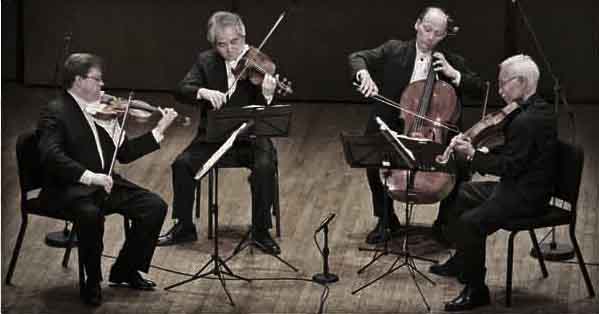 Thursday, March 15, 2012 – 8:00 pm.
Thursday, March 15, 2012 – 8:00 pm.
Among the projects of their valedictory season, the Tokyo Quartet is pairing Bartok’s string quartets with one by Haydn who was pivotal in developing the genre.
This evening opened with the chirpy, Italiante lyrical themes of Haydn’s G Major, Op. 64.No.4 underscored as if in soft charcoal by Clive Greensmith’s cello. The Allegro con brio mood is succeeded by a festive Menuetto with a ‘trio’ where Martin Beaver’s first violin gets to sing ‘concertante’ a sensuous melody ahead of his partners pulsing pizzicato. The first violin continues as the soloist in the Adagio song-without-lyrics braided with a contrapuntal tune from Kazuhide Isomura’s viola. The closing Presto is a ‘galop’ —the ensemble, balanced for colour, dancing in formation, showcasing the distinctive burnish of their tone.
It may be the Tokyo followed the Haydn with Bartok’s String Quartet No. 2, Op. 17 (1917) because String Quartet No. 1 Op. 1 (1905) is much the longer and fitted better after the intermission. It may also be that the Bartok’s No.1, despite its funereal opening movement builds towards a final rock concert level of excitement that is really good to go home in.
Historically, the second quartet reflects the Great War, Bartok’s ethnographical preoccupation with collecting authentic folk music of Hungary and surrounding countries, and his absorption of the atonal modernist stylings of Schoenberg and Stravinsky. In a remark on this performance that brings the above historical references into focus, a musician friend who sat beside me said “I kept hearing early Pink Flyod—Ummagumma.
The three movements are described by Bartok’s friend, composer Zoltan Kodaly, as “1. A quiet life. 2. Joy. 3. Sorrow.” The cello leaks lamentation grounding a hesitant, dissonant duo of viola and Kikuei Ikeda’s second violin. Martin Beaver introduces the rhythmically complex motto of thematic material. The ensemble develops it into a rich, dense, obsessive, fugal tapestry interwoven with the stories of the four instruments. The opening motto forces itself to the front and the movement concludes in the droning voice of the cello.
In the Allegro, drones based on African Berber sources and driving minimalist rhythms stutter helter-skelter in an insane tempo over a difficult, jagged terrain (Ummagumma?). The Finale, marked Lento begins with a growl from the cello and a duet of sighs from the violins, develops through 2-note call and response exchanges into a soporific mood that viola and cello conclude pizzicato like soft drumming that dissolves into darkness.
The evening ends with a backward look to 1905, Quartet No. 1, the 20-something composer, and a devastatingly unrequited love-affair that seems to have taught Bartok the meaning of the blues: how to use music to rise up from pain; how to make music to model the tension of expectation, and how to make music to find release from that tension when the outcomes of situations do not.
The opening fugal canon of sighs develops with increasing intensity until a passionate cry breaks out from lowdown in the viola’s register that unleashes a stunning display of tonal affects, an outburst of cathartic creativity. The playful second movement begins to dance rustically to a pizzicato rhythmic motto, that moves without break into the finale.
Although many ensembles have made great music out of this movement, in my experience, none have approached the excitement generated this evening by the Tokyo Quartet. Was it their canny gradations of loudness, their observation of velocities, their smooth, instant, unanimous negotiations of changes that gave this movement such convincing shape? Probably. Whatever the cause for the sense of heroic triumph they brought to the close of this evening, an emotional peak usually reserved for an evening with Beethoven (or a rock-concert, or the Gonsalves solo at Newport), the Tokyo Quartet made it happen here tonight.
I’m thankful I was there. By the end of next year, founding violist Kazuhide Isomura and Kikuei Ikeda, violinist of nearly 40 years, will both retire, and the last traces of the Quartet that was founded in 1968 will have evolved into something, hopefully as rich. Nonetheless, we will not hear their like again.
Please leave your comments HERE
